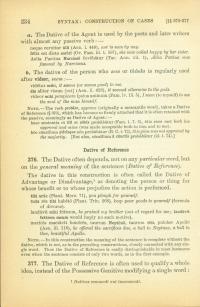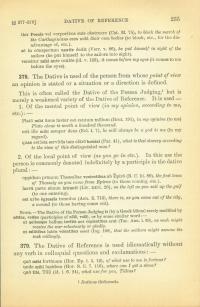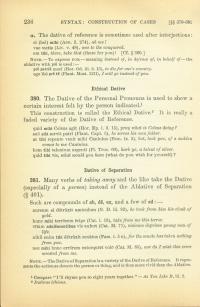376. The dative often depends, not on any particular word, but on the general meaning of the sentence (Dative of Reference). The dative in this construction is often called the Dative of Advantage or Disadvantage,1 as denoting the person or thing for whose benefit or to whose prejudice the action is performed.
Tibi arās. (Plaut. Merc. 71)
You plough for yourself.
Tuās rēs tibi habētō. (Plaut. Trin. 266)
Keep your goods to yourself.
(formula of divorce)
Laudāvit mihi frātrem.
He praised my brother (out of regard for me).
[laudāvit frātrem meum would imply no such motive].
Meritōs mactāvit honōrēs, taurum Neptūnō, taurum tibi, pulcher Apollo (Aen. 3.118)
He offered the sacrifices due, a bull to Neptune, a bull to thee, beautiful Apollo.
Note— In this construction the meaning of the sentence is complete without the dative, which is not, as in the preceding constructions, closely connected with any single word. Thus the Dative of Reference is easily distinguishable in most instances even when the sentence consists of only two words, as in the first example.
377. The Dative of Reference is often used to qualify a whole idea, instead of the possessive genitive modifying a single word.
iter Poenīs vel corporibus suīs obstruere (Cat. M. 75)
to block the march of the Carthaginians even with their own bodies
(to block, etc., for the disadvantage of, etc.)
Sē in cōnspectum nautīs dedit. (Verr. 5.86)
He put himself in sight of the sailors.
(He put himself to the sailors into sight.)
Versātur mihi ante oculōs. (id. 5.123)
It comes before my eyes.
(It comes to me before the eyes.)
378. The dative is used of the person from whose point of view an opinion is stated or a situation or a direction is defined. This is often called the Dative of the Person Judging,2 but is merely a weakened variety of the Dative of Reference. It is used:
- Of the mental point of view (in my opinion, according to meetc.).
Platō mihi ūnus īnstar est centum mīlium. (Brut. 191)
In my opinion (to me) Plato alone is worth a hundred thousand.Erit ille mihi semper deus. (Ecl. 1.7)
He will always be a god to me (in my regard).Quae est ista servitūs tam clārō hominī? (Par. 41)
What is that slavery according to the view of this distinguished man? - Of the local point of view (as you go inetc.). In this use the person is commonly denoted indefinitely by a participle in the Dative plural.
oppidum prīmum Thessaliae venientibus ab Ēpīrō (B. C. 3.80)
the first town of Thessaly as you come from Epirus.
(to those coming, etc.)laevā parte sinum intrantī (Liv. 26.26)
on the left as you sail up the gulf
(to one entering)Est urbe ēgressīs tumulus. (Aen. 2.713)
There is, as you come out of the city, a mound (to those having come out).Note— The Dative of the Person Judging is (by a Greek idiom) rarely modified by nōlēns, volēns (participles of nōlō, volō), or by some similar word.
ut quibusque bellum invītīs aut cupientibus erat (Tac. Ann. 1.59)
as each might receive the war reluctantly or gladlyut mīlitibus labōs volentibus esset (Iug. 100)
that the soldiers might assume the task willingly
379. The Dative of Reference is used idiomatically without any verb in colloquial questions and exclamations.
Quō mihi fortūnam? (Hor. Ep. 1.5.12)
Of what use to me is fortune?
Unde mihi lapidem. (Hor. S. 2.7.116)
Where can I get a stone?
Quō tibi, Tillī (id. 1.6.24)
What use for you, Tillius?
a. The Dative of Reference is sometimes used after interjections.
Ei (hei) mihi! (Aen. 2.274)
Ah me!
Vae victī. (Liv. 5.48)
Woe to the conquered.
Em tibi.
There, take that (there for you)!
[Cf. § 380]
Note— To express FOR—meaning instead of, in defense of, in behalf of—the ablative with prō is used.
prō patriā morī (Hor. Od. 3.2.13)
to die for one's country
Ego ībō prō tē. (Plaut. Most. 1131)
I will go instead of you.



